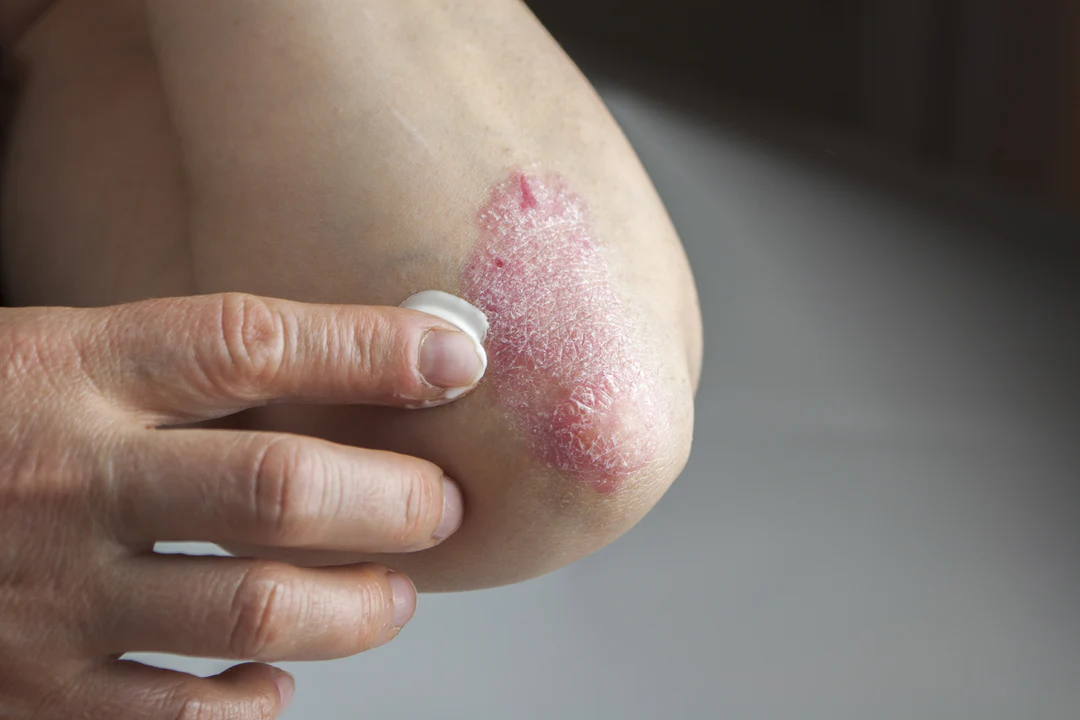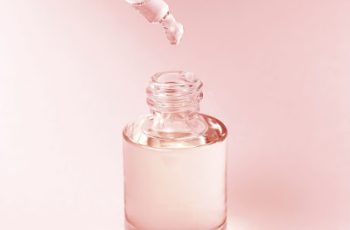
Does Salicylic Acid Help Psoriasis?
The thing about psoriasis is that there is little known about what exactly causes the inflammation. This can make it a difficult condition to treat, but luckily there is one skincare ingredient that has gained a good reputation for combating psoriasis, and that’s salicylic acid.
Before we dive in to finding out more about psoriasis and how salicylic acid helps, let’s have a brief recap on what they are and how they affect the skin.
What is Psoriasis?
Psoriasis is a skin disease with an unclear cause to how it creates the inflammation on the skin, be it body, scalp, or face. There is often a link to an immunity problem, such as an overactive immune system which increases the speed at which the turnover of the skin cells works too rapidly and prevent dead skin cells from shedding off the skin but will instead build-up.
Over time this will lead to visible signs of inflammations on the skin, such as raised plaques and scales. These can often look like severely dry areas, and sometimes appear flaky. Those who suffer from psoriasis will describe it as itching, burning, and stinging. It can appear anywhere over the body, from your ears and scalp to the hands, feet, and eyelids.
Leaving psoriasis untreated can impact the organs and outer surface tissue of the skin, this will explain why many who suffer from psoriasis will also suffer from other health conditions or tend to feel under the weather a lot of the time.
What is Salicylic Acid?
Salicylic acid is one of the most used ingredients from the family of chemical exfoliants called, beta hydroxy acids (BHA). You’ll also find that it is derived from willow bark, which results in salicylic acid being oil-soluble meaning it is able to penetrate the lower layers of the skin and help unclog the pores.
Whilst clearing out the pores, salicylic acid also works on the outer surface of the skin removing any build-up of dead skin cells, dirt, bacteria, and other impurities that can often sit on the skin resulting in signs of premature ageing, such as fine lines and wrinkles, uneven skin tone with areas of hyperpigmentation, and just a general lack lustre and dull looking complexion.
By sloughing away the layer of dead skin cells, you are ensuring other skincare products can absorb effectively and deliver results. Concerns with spots, blackheads and acne are also a thing of the past thanks to salicylic acid warding off excessive oil, debris and the spot causing P. acnes bacteria.
If you wanted to know more about salicylic acid and how it works on the skin, you can find out more over on The Beauty Insiders.
Does salicylic acid help psoriasis?
Yes, it can, salicylic acid is known for its exfoliating properties which has impressive results on the skin. With the potent BHA sloughing away the build-up of dead skin cells from the surface it will help combat the plaques and scales of skin caused by psoriasis. This will result in a softer, smoother complexion which will feel more comfortable and cleared of psoriasis inflammations.
One point you must remember is the varying potencies of salicylic acid can affect how it works on the skin. If, for example, if you use a stronger salicylic acid this can often cause irritation and if used on to treat scalp psoriasis can weaken the hair strands resulting in temporary hair loss. Therefore, it is very important to consult with a doctor, dermatologist, or medical professional before introducing SA into your daily skincare routine.
Does salicylic acid make psoriasis worse? It can do, as effective as salicylic acid is at clearing signs of psoriasis on the body, it shouldn’t be used as a long-term treatment. Instead, it is advised to use salicylic acid to help by initially clearing the skin of any psoriasis flare-ups and rebalancing the skin making it softer. For longer results without the side effects, it is best to consult with a dermatologist or doctor to find the optimal way of treating psoriasis. Which acid is best for psoriasis? As potent as it can be, salicylic acid is still considered the best acid to use to treat psoriasis. I have already mentioned the downside to using salicylic acid for an extended amount of time, therefore it is highly important to use the BHA as instructed and to avoid applying a liberal amount on the skin. It is also best to team salicylic acid with other hydrating ingredients, such as hyaluronic acid or niacinamide. These will help counteract the drying results of the acid and keep the skin barrier comfortable. Is salicylic acid good for scalp psoriasis? Yes, it is, there are many different products available containing salicylic acid formulated to help treat scalp psoriasis. Depending on the potency of the ingredient in the product formula will determine how it’s used. You’ll find it’s either applied topically to the problem areas or used on a more regular basis in the form of a shampoos and haircare products. Just word of warning, high potency can lead to hair strains becoming weak and brittle leading to hair loss. Although this is only temporary the inflamed irritated skin can take a long time to heal, only then will you see new hair growth once the skin is softened and calmed. Can psoriasis go away? Sadly, psoriasis can never go away completely, instead you’ll find it goes into remission which can flare-up at any time. Even without using any treatment you may find sometimes that psoriasis appears to improve and even disappear, this could be a result of many different things, such as your immune system functioning correctly. The best way of combating this is to take each day as it comes, enjoy the times you find your psoriasis is cleared and prepare yourself for the next flare-up, especially as your approach winter months as these are the most difficult to keep on top of any future flare-ups. How do you stop psoriasis from spreading? There are some different ways of combating psoriasis flare-ups and prevent them from spreading. Here are some examples of the most effective ways proven to maintain your skin at its heathiest state. Always use a hydrating product Keep the skin comfortable and hydrated by applying a moisturiser or serums enriched with hyaluronic acid or another moisturising ingredient, such as niacinamide or vitamin E. It is also thought a good idea to apply a thick amount of petroleum jelly over the skin at night to help lock in moisture leaving you with a comfortable and healthy complexion come morning. Prepare for dry, cold climates It’s known that cold weather is psoriasis’s worse nightmare. Therefore, a well-established skincare routine as well as using a humidifier will keep the skin comfortable and prevent any flare-ups. Maintain a healthy lifestyle This can sometimes feel impossible but try your best to maintain a healthy lifestyle as much as possible. This can include daily exercise, eating a well-balanced diet, and keeping an eye on your alcohol consumption. Avoid stress Stress is a proven link to flare-ups in some skin concerns like psoriasis. To avoid a flare-up, try different relaxation techniques, this can be anything from reading, long walks, and yoga. There you have a little more information about how salicylic acid can help with psoriasis. Don’t forget if you have any questions, come and follow us on Instagram.
DQH Can I use salicylic acid first and then vitamin C?
It’s easy to create a skincare routine, but knowing how to use it is another thing entirely. In most cases, if you’re not getting the desired skin results, it could be due to the layering of conflicting ingredients. So, is it possible that salicylic acid and vitamin C are such ingredients? Or are these active ingredients the duo that’s been missing from your skincare routine? If you want answers, stick around because today we are going to explain the benefits of salicylic acid and vitamin C and how they can be used in your daily life.
What are the benefits of salicylic acid for skin?
Salicylic acid is one of the most commonly used beta hydroxy acids and is favored by many people with oily, acne-prone skin. This acid is derived from willow bark, and unlike its water-soluble relatives (called alpha-hydroxy acids), salicylic acid is oil-soluble, which means it can penetrate deeper into the lower layers of the skin. Once it reaches the lower layers, it can help unclog pores of excess sebum, dirt, bacteria, debris, and impurities. This results in clearer skin tones and greater definition.
Not only does salicylic acid benefit the underlying layers, but the outer surface of the skin benefits as well. When applied to the skin, salicylic acid removes the buildup of dead skin cells. This is accomplished by breaking the bonds that hold dead cells to the surface. Over time, this can cause the complexion to look dull and prone to acne, blackheads, and other blemishes.
If you’d like to learn more about salicylic acid and how it can improve your skin, check out this dedicated blog post from a beauty insider.
What are the benefits of vitamin C for skin?
Vitamin C is considered one of the most powerful antioxidants, which means it is very effective at fighting free radicals and preventing them from causing further skin damage. Examples of free radicals include pollution, central heating, UV rays and harsh climate. They attack proteins, fats and cell membranes as soon as they come into contact with the skin, causing signs of premature aging such as fine lines and wrinkles as well as hyperpigmentation, flaky patches of skin and loss of elasticity.
Many people usually prefer to use vitamin C in their morning routine as this ingredient gives the complexion a radiant glow. You’ll also find that vitamin C can target areas of hyperpigmentation, plumping the skin and reducing the appearance of fine lines and wrinkles.
The thing about vitamin C is that there are a lot of outdated studies going back to the 1950s that describe vitamin C as an unstable skin component. Thanks to improvements in modern technology, this is no longer the case as all products now contain a stable form of vitamin C.
Visit The Beauty Insider to learn more about vitamin C. So please check out our blog post.
Can I use salicylic acid first and then vitamin C?
Yes, you absolutely can. In fact, it’s thought that using salicylic acid before using vitamin C ensures it penetrates faster and works faster.
This is an efficient way to utilize two power sources, and the reason has to do with pH. For example, the skin’s natural pH is about 4.7, making it slightly acidic. Salicylic acid and vitamin C are also both acidic, and you’ll find that vitamin C is absorbed quickly into the skin. Therefore, using salicylic acid beforehand can increase the acidity of the skin and allow vitamin C to penetrate into the skin faster.
While this is considered an effective way to combine two powerful ingredients, you need to be aware of your skin type and how it reacts to certain active ingredients. Even people with perfect, normal skin can experience skin sensitivity and irritation. Therefore, always consult a doctor or dermatologist before using any new products on your skin.
It’s also important to follow skin application rules. In this case, you need to use the product correctly to ensure you get the best results for your skin. If you’re not sure what I mean, the basic rule for skin is to start with the thinnest consistency and work your way up to the thickest consistency. This prevents a barrier from forming on the surface, preventing other active ingredients from penetrating the skin.
Can I use salicylic acid at night and vitamin C in the morning?
Yes, absolutely, this is considered the most effective way to get returns without any adverse side effects. This is because there is enough time between applications to ensure that the skin’s pH levels return to balance.
You’ll also find that Vitamin C is rich in antioxidants and is perfect for use in the morning to ensure your skin is protected and looking its healthiest. Due to the small size of salicylic acid molecules, it is an acid that is able to reach the deepest parts of the skin. While this is effective at keeping skin clear, it also increases the risk of irritation and photosensitivity. Therefore, many people prefer to use powerful BHAs in their evening routine without exposure to UV rays, pollution, or harsh weather.
Warning: If you avoid using sunscreen every day, none of these ingredients will do what your skin needs. The combination of chemical peels and powerful ingredients increases the risk of further damage to the skin’s surface. Use SPF 50 every day to keep your skin protected and your lipid barrier healthy, even on cloudy days, keeping your skin in top condition.


